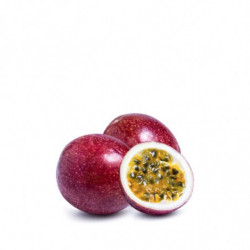- Out-of-Stock


Passion Fruit: The Exotic and Healthy Marvel
Passion fruit, also known as maracuyá or granadilla, is a tropical fruit with a thick and rough skin that can be yellow or purple. It has a juicy and gelatinous pulp with black seeds. Its taste is acidic and sweet, with an intense and exotic aroma. It is a fruit that can be consumed fresh or used to prepare juices, smoothies, cocktails, jams, sauces, desserts, and other dishes. Its flavor pairs well with ingredients like yogurt, cream cheese, chocolate, coconut, mango, or banana. It is a fruit that offers many health benefits, being rich in water, fiber, vitamins, minerals, and antioxidants.
 Security policy
Security policy
Website built using newest versions, SSL protocols, Secure payments
 Delivery policy
Delivery policy
Receive your order in 24-48h
 Return policy
Return policy
100% Satisfaction guarantee

Guarantee safe & secure checkout
Explore the Wonderful World of Passion Fruit: Origin, Gastronomy, and Health Benefits
Passion fruit, also known as maracuyá or granadilla, is a tropical fruit native to the Amazon and cultivated in tropical and subtropical regions of America, Africa, Asia, and Oceania. Its thick, rough skin can be yellow or purple, and its juicy, gelatinous pulp, with edible seeds, offers an acidic and sweet taste with a distinctive aroma.
Historically, passion fruit was consumed by South American indigenous peoples before the arrival of Europeans. Its name, derived from Guarani "mburucuyá," means "food in a bowl." Missionaries named it "passion fruit" for the similarity of its flower to symbols of the Passion of Christ.
In gastronomic terms, passion fruit is versatile and can be consumed fresh or used in juices, smoothies, cocktails, jams, sauces, desserts, ice creams, and more. It pairs well with ingredients like yogurt, cream cheese, chocolate, coconut, mango, or banana.
From a health perspective, passion fruit is rich in water, fiber, vitamins (A, C, and B-group), minerals (potassium, magnesium, phosphorus, and calcium), and antioxidants. These nutrients offer benefits such as body hydration and purification, improved digestion, regulation of blood sugar and cholesterol, strengthening of the immune system, and disease prevention.
In agricultural terms, passion fruit is a perennial plant with woody and flexible stems that requires a warm and humid climate. Its solitary flowers are large and showy, and the fruit is harvested between 6 and 9 months after planting.
We suggest an easy passion fruit mousse recipe for you to enjoy. Follow these steps: